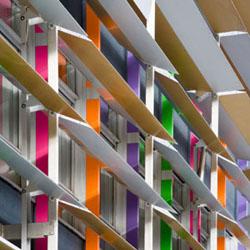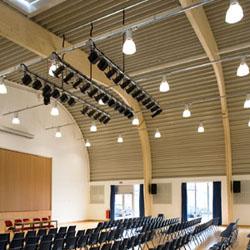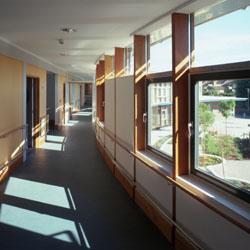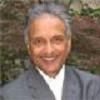| Sunand
Prasad: elected
President of the Royal Institute of British Architects (RIBA) |
|
 |
NRI architect,
elected President of the Royal Institute of British Architects
(RIBA)
(One of the most influential
architectural institutions in the world with 30,000 members)
UK, April 08, 2007
Sunder Agnihotri
NRI Sunand Prasad, 56, architect, has
been elected President of the prestigious and influential architectural
institutions- Royal Institute of British Architects (RIBA). He is
currently servimg as vice president of this institution and and
will succeed the current President, Jack Pringle, on 1 September
2007.
Sunand Prasad said, “I feel
honoured and privileged to be elected as the next RIBA President
and keenly conscious of the responsibility now to make the changes
set out in my manifesto. I want to thank warmly all those who supported
me and also Valerie Owen whose own tremendous campaign ensured that
the full range of issues was discussed. I look forward to supporting
current President Jack Pringle over the next year and will make
it a priority during this time to get closer to RIBA members, visiting
as many as possible. We can only build the influential profession
that we want, and society needs, by the RIBA more effectively involving
its members.
“As RIBA President I will have two other priorities. One will
be campaigning for design because of the enormous difference it
can make to people’s lives. The other will be tackling the
issue of climate change. Buildings account for almost 50% of energy
use. As a body of architects, and an international organisation,
the RIBA must play a key part in countering this threat to our collective
futures.



Sunand Prasad
Sunand Prasad said, "At
the age of four I was given a small trowel to help point the stone
floor slabs of the newly built art school that my father ran in
a Gandhian community in Central India. That and Meccano are partly
responsible for my standing for RIBA President now."
- He was born in 1950 in Dehra Dun in the Himalyan foothills.
- He spent most of the first 12 years of his life in Mahatma
Gandhi’s Ashram in Sevagram, central India.
- His family came to England in 1962 and he went to secondary
modern and grammar school in north London. He studied architecture
at the University of Cambridge and the Architectural Association
schools of architecture.
- From 1976 to 1984 he worked with Edward Cullinan Architects,
leaving to combine practice and research.
- He was one of the “40 under 40” architects in the
1985 exhibition. At the same time, he commenced a study of north
Indian courtyard houses and urban form as a research fellow at
the Royal College of Art, leading to a doctorate in 1988.
- Sunand Prasad lives with his wife and three sons in north London
in a self-built house. He enjoys music, art, cycling and eating
and would love to get back to windsurfing.
Work:
- His architect practice first built a reputation through winning
RIBA Awards in 1990 and 1991 with domestic projects.
- He became known for its healthcare designs which were exhibited
in “The Art of the Process” and the “How did
they do that?” exhibitions.
- Prasad have gone on to design a wide variety of building types,
winning over 40 awards for their work, which has been widely published.
- He was on the RIBA Practice Committee and set up its Constructive
Change Group. He was elected to RIBA Council in 2004, is a member
of the RIBA Board and Vice President for Policy and Strategy.
- In 1999, Sunand Prasad was appointed as one of the first seven
CABE Commissioners and launched its Enabling Programme. He has
been closely involved in developing the Commission’s Corporate
Strategy and has chaired a number of Project Steering Groups.
- He has been chair of the CABE Skills Programme, stepping down
at the completion of his two terms as Commissioner in July 2006.
- Sunand Prasad has played a leading role in developing the Construction
Industry Council’s Design Quality Indicator (DQI).
- Most of his career, Sunand Prasad has been involved in architectural
teaching and has served as external examiner on a number of courses.
Currently, he is a member of the Cambridge University School of
Architecture Advisory Committee.
Writings:
Sunand Prasad’s published writings include essays
on Le Corbusier, North Indian urbanism, culture and identity,
the value of design, architects and the construction industry
as well as a number of book and building reviews. He is the managing
editor of a forthcoming book on hospital architecture and author
of a forthcoming monograph on the work of Penoyre & Prasad.
......Source- RIBA press releases

|
|
|
| Sunand
Prasad |
| 
NRI architect elected President
of the Royal Institute of British Architects (RIBA)
(One of the most influential architectural institutions in the
world with 30,000 members).
- He was born in 1950 in Dehra
Dun in the Himalyan foothills
- Sunand Prasad jokes that, in his professional life, he has
skipped a generation by following in the footsteps of his grandfather,
a "self-made businessman", rather than his father, "an
unreconstructed Gandhian". But as a leading British architect
with strong roots in community projects - health and social care
centres, schools, flats for the homeless, older people's care
units, a young people's centre, a multicultural arts complex and
much else - it is clear that his father has had a strong influence
on his life and values.
Royal Institute of
British Architects (RIBA):
The Royal Institute of British Architects, one of the most influential
architectural institutions in the world, has been promoting architecture
and architects since being awarded its Royal Charter in 1837. Then
the RIBA's remit was 'the general advancement of architecture'.
Today's mission statement continues to embody these sentiments.
The RIBA is a member organisation, with 30,000 members, headed by
president Jack Pringle, and with an executive of 170 staff at the
HQ in central London and in a dozen regional offices. |
|




